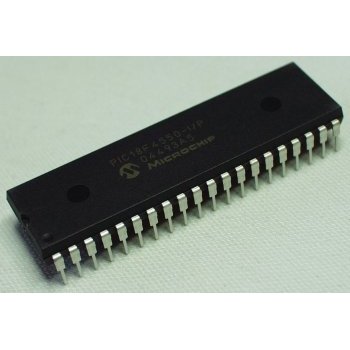PIC 40 Pin 48MHz 16K 13A/D USB - 18F4550
Replacement: None. We are no longer carrying this 18F4550 microchip in our catalog. This page is for reference only.
This is the new gorilla from Microchip! The 18F4550 has 32K of flash, 12 MIPs from a 48MHz external crystal (internal PLL up to 48MHz), and a hardware Full Speed USB 2.0 peripheral. That's right, this little guy can communicate directly with USB. Package can be programmed in circuit and even has a dedicated ICD port on the TQFP versions.
PIC 40 Pin 48MHz 16K 13A/D USB - 18F4550 Product Help and Resources
Core Skill: Soldering
This skill defines how difficult the soldering is on a particular product. It might be a couple simple solder joints, or require special reflow tools.
Skill Level: Rookie - The number of pins increases, and you will have to determine polarity of components and some of the components might be a bit trickier or close together. You might need solder wick or flux.
See all skill levels
Core Skill: Programming
If a board needs code or communicates somehow, you're going to need to know how to program or interface with it. The programming skill is all about communication and code.
Skill Level: Competent - The toolchain for programming is a bit more complex and will examples may not be explicitly provided for you. You will be required to have a fundamental knowledge of programming and be required to provide your own code. You may need to modify existing libraries or code to work with your specific hardware. Sensor and hardware interfaces will be SPI or I2C.
See all skill levels
Core Skill: Electrical Prototyping
If it requires power, you need to know how much, what all the pins do, and how to hook it up. You may need to reference datasheets, schematics, and know the ins and outs of electronics.
Skill Level: Competent - You will be required to reference a datasheet or schematic to know how to use a component. Your knowledge of a datasheet will only require basic features like power requirements, pinouts, or communications type. Also, you may need a power supply that?s greater than 12V or more than 1A worth of current.
See all skill levels
Comments
Looking for answers to technical questions?
We welcome your comments and suggestions below. However, if you are looking for solutions to technical questions please see our Technical Assistance page.
Customer Reviews
No reviews yet.


I hate to be "that guy" but the $11 price is twice the single-unit price at Mouser or Digikey. What gives?
Broken link "USB tutorial using the 18F4550"
Thanks for catching that! It looks like the original tutorial has disappeared, but we should have a new link up there soon.
I got a little LCD proto board from the dumpster dive, and it uses, but didn't come with one of these bad boys, so I'm thinking of throwing it into my next order.
This is a bad little dude! You will find many examples on the web that walk you through the USB portion of this guy.<br />
<br />
Ensure you use the correct capacitors! or else the USB will have difficulty enumerating.
I found this website on hack-a-day. It teaches you the basics of working with this specific chip to create a USB device:
http://www.waitingforfriday.com/index.php/Building_a_PIC18F_USB_device